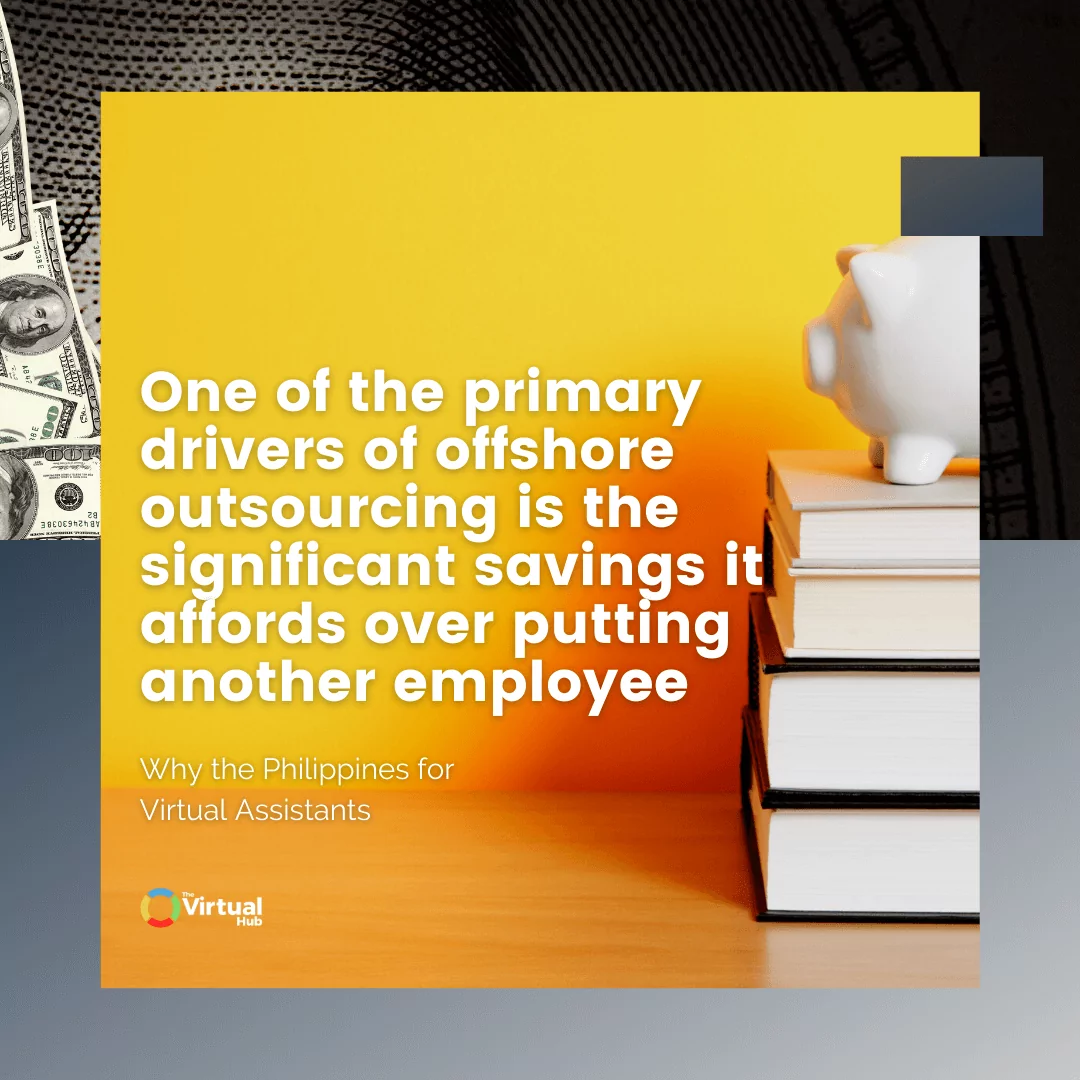The demand for both onshore and offshore virtual assistants (VAs) had been growing for over a decade now, with no signs of slowing down.
For offshore virtual employees, most of the top locations for VAs (as well as other types of skilled, remote workers) are in Asia (e.g., India, China, Malaysia), South America (e.g., Brazil, Chile), and Eastern Europe (e.g., Bulgaria).
Among the myriad options available, we believe the Philippines is the best location for Western businesses to outsource their repeatable tasks to virtual assistants.
Read on to find out why the Philippines is a great country to outsource your VA work to!
RELATED: The Benefits Of Outsourcing: Understanding How It Can Help Your Business
Best Virtual Assistant Services: Philippines as the Top Outsourcing Destination
You can click on these links below to jump on a specific section:
About the Republic of the Philippines
Before we get into the reasons why the Philippines is consistently ranked high among the best sources of virtual assistants, let’s take a brief look at the country and its history.
Most Westerners have heard of the Philippines, yet might have trouble locating it on a globe, so let’s pinpoint where we’re talking about.
The Republic of the Philippines–the country’s official name–comprises over 7,600 islands in the Western Pacific Ocean. Those islands are divided into three island groups, 17 regions, and 81 provinces.
The country’s capital, Manila, sits on the island of Luzon, the largest in the archipelago. The nation is bordered by the South China, the Philippine, and the Celebes Seas, and it is situated east of Vietnam, south of Taiwan, and north of Indonesia.
Prehistoric and early historic migrations from the Asian mainland and other Pacific islands started the island nation on a path to great diversity. In the modern era, the Philippines endured over 300 years as a Spanish colony and was later governed by the United States and by Japan. It finally became an independent nation in 1946.
Politically, the country shares the democratic values of European and Western countries. From a religious perspective, roughly 90% of Filipinos are Christians due to the influence of Spain during the 300 years of colonization.

These are just a few of the many reasons Filipinos and Westerners are typically a good cultural fit for working together. Historically, the Philippines has been a Third World country and is currently a developing country considered to be an emerging market.
Difference between Virtual Assistants, Administrative Assistants, Personal Assistants, and Customer Service Representatives
Now that we have a little more background on the Philippines, let’s talk about what VAs do and how they differ from an administrative assistant (AA), a personal assistant (PA), and a customer service representative (CSR).
First, it’s important to understand that virtual assistants work remotely–usually via email, phone calls, and video conferencing. They provide virtual services, such as creative, technical, and administrative assistance to businesses and entrepreneurs.
The tasks they perform are similar to those of an administrative assistant or executive assistant in a traditional office setting. However, because they work virtually, they can serve clients located anywhere in the world.
One of the main benefits of working with a VA is that they can do many of the same things as an on-staff administrative assistant or personal assistant, but at a fraction of the cost.
Additionally, VAs can often be more flexible and available than an in-house employee because they are not limited by geography. They can also offer a wider range of skills and support services than a single AA or PA since they usually specialize in one or two areas.
Here at The Virtual Hub, we have a team of expert virtual assistants who specialize in tasks like:
- customer service
- telemarketing
- lead generation
- social media management
- digital marketing
- web design
- graphic design
- data entry
- internet research
An administrative assistant, on the other hand, is typically employed by one company to work on-site–not virtually–providing secretarial and administrative support. Meanwhile, a personal assistant is usually employed by an individual to provide both personal and professional support, also on-site, while customer service representatives are usually employed by a company to work either on-site or remotely to provide customer service and technical support via phone, email, and/or live chat.
Reasons to Outsource to the Philippines
Now that we’ve defined what VAs do, let’s look at some specific reasons why the Philippines is an excellent source for VAs:
English Is an Official Language
One of the key reasons the Philippines is an appealing source of virtual assistants is their widespread English literacy rate and overall competence with the English language.
English had been introduced earlier to the Philippines, but it began to really take hold in the early 1900s after Spain withdrew and the United States was governing the country. In 1901, the Americans introduced free, public education, which was taught in English.
The Philippines finally became an independent nation in the 1940s, and by the 1980s the government designated English as an official language along with Filipino, which is also considered to be the national language of the country. As such, English is taught to the population beginning in primary school, which is why most Filipinos can speak and understand English.
Furthermore, because of the lingering influence of the U.S., Filipinos consume a lot of Western media, which has just become increasingly accessible in the digital age. Therefore, many Filipinos are not only fluent in English, they speak it with an accent that more closely resembles that of Westerners than English speakers in other countries such as India.

The relative ease in which Westerners and Filipinos can communicate in English is a key reason the Philippines is one of the current hotspots for virtual assistant services.
Cultural Compatibility

Both Spain and the United States were, over the course of about 400 years, colonizers of the Philippines. That long period of direct Western influence irreversibly affected the Filipino culture.
For example, at 112 million people, the country has the largest Christian population of any of the Asian nations, accounting for 90% of the population. Of those, more than 86% are Roman Catholic due to several centuries of Spanish occupation.
Filipinos have been consuming Western, predominantly American, media dating back to the early 1900s. So, although they also maintain the traditions of Filipino folk culture–their “traditional” ways of expression–Western influences are largely responsible for pop culture in the Philippines.
Finally, the educational system in the Philippines was created based upon the American model. The system that exists in the Philippines today is derived from a group of teachers who set up schools in the Philippines in the 1950s. One benefit of this for Americans, from a hiring perspective, is that it’s easy to understand a Filipino’s level of education, as their levels are analogous to those in the U.S.

Other Cultural Positives
There are additional factors that make Filipinos and Westerners a good “fit” for working together. For instance, Filipinos tend to value camaraderie, collaboration, and belonging. Also, they can be very creative and resourceful; however, they are also often humble.

As a result, they may be reluctant to speak up. This is why when working with Filipinos, you may need to tell and remind them you are interested in their input.
In addition, they are very hospitable and genuinely friendly. And finally, they’re typically a lot of fun and very celebratory. They enjoy big celebrations for holidays and birthdays, both at work and with family.
Time Zones Are Not an Issue

The United States is the biggest consumer of Filipino outsourcing services, accounting for over 80% of the Philippines’ outsourcing market. Yet, a 10-12 hour time difference exists between the Philippines and the U.S., depending upon the region and time zone of the business in the U.S.
Some U.S. business owners outsource to the Philippines because they want to have team members completing work tasks while they are sleeping. Whereas others are looking for team members to work opposite their own hours in order to extend hours of operation for their clients.
However, it’s often the case that U.S. business owners can hire in the Philippines and work “together” during some or all of the same hours, while it’s daytime in North America. Because virtual assistant positions offer competitive pay in the Philippines, a night shift culture has emerged there to accommodate the demand from U.S. businesses.
For example, at The Virtual Hub, our dedicated virtual assistants work in our equipped offices, and we run a 24-hour operation to meet the demand for virtual assistants to fit our clients’ scheduling needs.

Government Support
Another factor that has contributed to the rapid growth of outsourcing services, including virtual assistants, in the Philippines is that the Filipino government recognized the growth potential of the industry and the economic benefits that would come with it.

In 1995, the government passed the Special Economic Zone Act, which made it easier for businesses in the Philippines to provide services and offer tax incentives to attract foreign investors.
In addition, the government sponsors university courses on topics related to outsourcing virtual business process, as the virtual assistant industry continues its rapid growth.
At the same time, it can be a bit of a challenge for a business owner to navigate and remain compliant with Filipino labor laws.
Small business owners who want to avoid those concerns have the option to hire multiple virtual assistants and talented Filipino workers through outsourcing agencies or virtual assistant companies in the Philippines, which will help them or take responsibility for managing labor law compliance.
RELATED: Entrepreneurs: It's Time To Stop "Doing" And Start To Delegate Effectively
Cost Savings
One of the primary drivers of offshore outsourcing is the significant savings it affords over putting another employee–for whom you must provide equipment, benefits, etc.–on the payroll or contracting with a more local contractor.
As a “less developed” nation, the standard of living is far different than it is in Western countries. Business owners who hire virtual assistants overseas can save anywhere from 60 to 80% on wages, while still providing a Filipino with rewarding work and competitive wages.
For example, a general and experienced virtual assistant in the Philippines who performs basic administrative tasks, data entry, and web development may earn $10-14 an hour, whereas the same quality of work performed in the business owner’s home country might cost $25-50 an hour. Yet, the wage of a Filipino virtual assistant is roughly on par with professional positions in fields such as health care and education.

Educated, Savvy Virtual Assistant Talent Pool

The Philippines boasts a young and educated population, graduating 450K university students each year. As a young population, whose government endorses and sponsors educational initiatives in the industry, Filipinos tend to be proficient in technology and are savvy at navigating the digital world.
Often, when people think of offshoring to the Philippines–or to similar countries–they often assume that the nation is only a source for basic skills. That’s a myth! Although, hiring virtual assistants to perform relatively basic tasks is a popular solution for small and large businesses alike, specialist VAs and higher-level professional services support can be found on the island nation.
In fact, that’s an additional benefit of looking to the Philippines for virtual assistance: It gives you access to a much larger talent pool than a domestic search would yield. So you can truly find the best person to add to your business team!

Caveats to Outsourcing to the Philippines
We established The Virtual Hub in the Philippines because our analysis showed the nation fared better than other locations when we weighed the pros and cons.
However, we always want to be completely transparent and a source of truth to our audience and to our clients. So, we also want to share with you a few pitfalls to watch out for, should you decide to outsource business processes to the Philippines.
Filipinos, just like the rest of us, are unique in terms of abilities and personalities, but we are all also heavily influenced by our societal culture and cultural norms.
So, when we share these caveats, we’re not making blanket statements about how “all Filipinos” behave. We’re merely acknowledging common, behavioral tendencies that are influenced by the Filipino culture.
The Tendency to Be a “Yes” Culture
We don’t mean a “YES! I can do that!” culture. We’re referring to the likelihood that Filipinos will tell you they agree to things you say or request–will tell you “yes”–when they truly don’t agree or otherwise have doubts about the request.
Culturally speaking, Filipinos value keeping the peace over rocking the boat. While not necessarily a bad quality across the board, their tendency to agree with you can leave you with uncertainty about where you stand on a task or issue.
For example, if they’ve agreed to complete a task you’ve assigned, but they are concerned the task isn’t the right task or isn’t being done in the right way, they may be reluctant to tell you about their reservations. So, you’re missing out on what could be valuable feedback about how to approach something differently.
Similarly, if they’re working toward a deadline and expect to have legitimate trouble meeting it, they may not be comfortable telling you. Then, if the deadline is missed, you both could find yourselves scrambling to put out fires.
Had you known the deadline was in jeopardy ahead of time, there may have been a roadblock you could remove for them so the deadline could be met. Or the two of you could have come up with an alternative plan to complete the work, adjust timelines, and so forth–and avoid the fire fighting.
To combat this, we recommend that you tell–and periodically remind–your virtual assistant that you are always interested in their feedback and any personal “rules” you might have around communication.
For instance, in the deadline example, you might tell your virtual assistant to let you ASAP any time meeting a deadline is at risk, as well as why.

Also, in your routine meetings and communications with your virtual assistant, directly ask for their input and encourage them to share with you. And don’t forget, if they share “bad” news with you, but it’s going to help you avoid a worse situation later, respond accordingly. If you become overly upset, they will probably be less likely to speak up the next time.

The Potential for Taking Advantage
Again, we’ll reiterate that this is a possibility rather than a likelihood. Because of the disparity in economic conditions between your home country and the Philippines, some Filipinos might try to take advantage of the fact that you may have the means to help them financially, above and beyond offering them gainful employment.

We have seen it happen where a virtual worker in the Philippines experiences a bit of a budgetary hardship and approaches their client for financial help.
We’ve also heard from business owners who’ve had virtual workers from the Philippines “milk” a difficult situation, playing on the client’s sympathy, as an excuse for poor output and missed deadlines.
At The Virtual Hub, we have a strict policy–and one we’re sure our clients are aware of–that our virtual assistants are not permitted to solicit additional funds from the business owners they are working with. And should something like that occur, we intervene to resolve the issue.
At the same time, our business model provides our virtual assistants with competitive wages and excellent benefits, as well as the office space, equipment, and day-to-day support they need to be successful.
It’s an added benefit of hiring remote employees through a virtual staffing company like ours. You can rest assured that our team members are being well taken care of and that we fully support our clients when problems arise.
Professional Lines Can Become Blurred

Filipino life is centered squarely on family, and they often treat the people they work with like family, as well. As a result of their communal cultural and the value placed on family, there’s the possibility for them to overshare and to treat the relationship in too casual a manner.
You can probably see how blurred lines around your working relationship would make it all the easier for them to feel comfortable asking for additional money or to expect to be let off the hook for lackluster work.
Although we absolutely hope that you get to know your virtual assistant on a personal level, just as you would with a co-located employee or co-worker, be careful to keep it professional.

Fun Facts about the Philippines
We explained that we always want to be honest and transparent, but we also don’t want to end on a bad note! So here are a few fun things worth knowing if you’re considering adding a virtual team member from the Philippines:

- Estimates indicate there are roughly 182 ethnic groups living in the Philippines, and no fewer than 120 distinct languages–and hundreds of dialects–are spoken in the country!
- Although the Philippines is a geographically small country, it’s the 13th most populous country in the world!
- Two of the world’s top 10 largest shopping malls are in the Philippines.
- Philippines discovers new animal species at a higher rate than any other nation. For mammals alone, 15 new species have been identified in the last 10 years.
- It’s believed that U.S. soldiers who were stationed in the Philippines during World War II brought back the terms “boondocks” and the shortened “boonies” from the Filipino (Tagalog) word “bundok,” which means mountain.
- Christmas celebrations in the Philippines last longer than anywhere else in the world, starting as soon as the “-ber” months roll around. They begin playing carols in September and the season doesn’t end until January with the celebration of the Feast of Three Kings.
Final Thoughts
We believe the Philippines is an excellent resource for business owners looking to add a virtual assistant or two to their team. The combination of a high level of English proficiency, technical skills, and a strong work ethic makes Filipinos the best virtual assistants in the world!
If you're interested to hire Filipino virtual assistants, we at The Virtual Hub are more than happy to help you get started! We provide high-quality, reliable, and cost-effective virtual staffing solutions for businesses of all sizes! You can be confident you’ll be working with a virtual assistant company that takes care of its team members and that is committed to solving any problems that may arise.
Plus, we'll help you with the whole hiring process--from finding the right candidates to conducting interviews and onboarding your new hire! And of course, we'll make sure that your Filipino virtual assistants are fully trained and up to the task.
We have a long history of happy clients, and we’d love to add you to that list!
